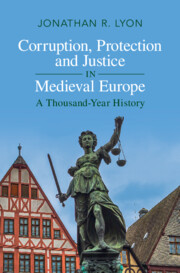Book contents
- Corruption, Protection and Justice in Medieval Europe
- Corruption, Protection and Justice in Medieval Europe
- Copyright page
- Dedication
- Contents
- Maps and Figures
- Acknowledgments
- Abbreviations
- Additional material
- Introduction
- 1 The First “Medieval” Advocates
- 2 Putting Down Roots in Ninth-Century Francia
- 3 The “Aristocratization” of Post-Carolingian Advocacy
- 4 Elite Competition at the Turn of the First Millennium
- 5 The Limits of Church Reform
- 6 Pigs and Sheep, Beer and Wine, Pennies and Pounds
- 7 A History of Violence
- 8 Weapons of the Not-So-Weak
- 9 The Murder of Archbishop Engelbert
- 10 Widening the Lens
- 11 The Emperor as Vogt, ca. 1000–1500
- 12 From Lordship to Government?
- 13 Reframing the History of Violence
- 14 Crossing the False Divide
- 15 A Cultural History of the Rapacious Advocate, or: William Tell’s Revenge
- Conclusion
- Works Cited
- Index
11 - The Emperor as Vogt, ca. 1000–1500
Published online by Cambridge University Press: 12 October 2022
- Corruption, Protection and Justice in Medieval Europe
- Corruption, Protection and Justice in Medieval Europe
- Copyright page
- Dedication
- Contents
- Maps and Figures
- Acknowledgments
- Abbreviations
- Additional material
- Introduction
- 1 The First “Medieval” Advocates
- 2 Putting Down Roots in Ninth-Century Francia
- 3 The “Aristocratization” of Post-Carolingian Advocacy
- 4 Elite Competition at the Turn of the First Millennium
- 5 The Limits of Church Reform
- 6 Pigs and Sheep, Beer and Wine, Pennies and Pounds
- 7 A History of Violence
- 8 Weapons of the Not-So-Weak
- 9 The Murder of Archbishop Engelbert
- 10 Widening the Lens
- 11 The Emperor as Vogt, ca. 1000–1500
- 12 From Lordship to Government?
- 13 Reframing the History of Violence
- 14 Crossing the False Divide
- 15 A Cultural History of the Rapacious Advocate, or: William Tell’s Revenge
- Conclusion
- Works Cited
- Index
Summary
This chapter starts the transition to the period after 1250 and argues that advocacy remained important into the fifteenth century (and later), in part because it was central to debates about imperial and papal authority. Beginning in the twelfth century, both popes and emperors insisted that the German ruler was the special advocate of the Roman Church, but the two sides differed on what this title meant. While the popes asserted that it was the emperor’s responsibility to defend the Church from its enemies and that the popes therefore had a role to play in selecting an able defender, the emperors claimed that as advocates they could exert wide-ranging influence over the Church and even call Church councils when necessary. This conflict not only highlights the inherent fluidity of the role of the advocate centuries after it first appeared but also helps to explain why so many people would continue to want to call themselves advocate during the half-millennium after 1250.
- Type
- Chapter
- Information
- Corruption, Protection and Justice in Medieval EuropeA Thousand-Year History, pp. 234 - 253Publisher: Cambridge University PressPrint publication year: 2022



